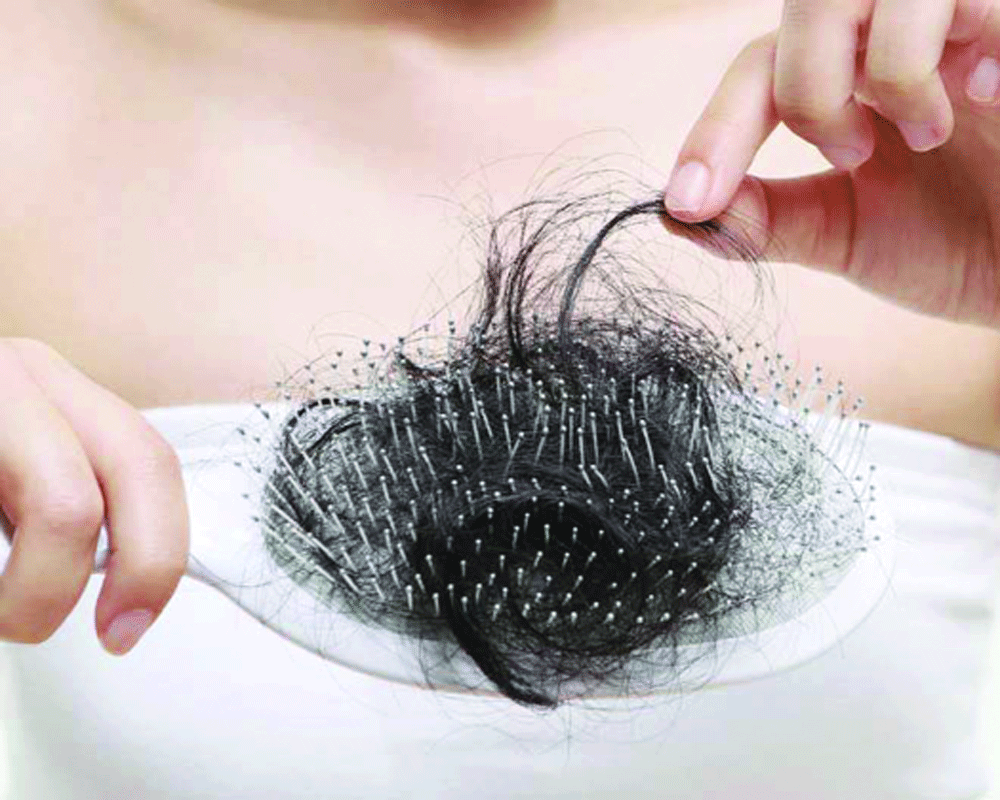A lot of people are now experiencing post-COVID hair loss. While it may be alarming to some, doctors tell MUSBA HASHMI that one doesn’t need to panic and that some easy tips will come in handy
While defeating COVID and gaining back our health has definitely been one of our major achievements of life, but the killer has still managed to leave behind its footsteps in the form of post-COVID complications. One of which is hair fall.
Those extra hair on the comb or on the ground are sufficient to give us a mini heart attack. While it can be a cause of concern, doctors say one shouldn’t panic.
“A few months after recovering from COVID-19, many people see noticeable hair loss. It is actually hair shedding more than actual hair loss. The medical name for this type of hair shedding is Telogen Effluvium. It happens when more hair than normal enter the shedding (telogen) phase of the hair growth lifecycle at the same time. A fever or illness can force more hair into the shedding phase,†says Dr Amit Vij, Senior Consultant, Dermatology, PSRI Hospital, New Delhi.
Dr Shuchin Bajaj, Founder & Director, Ujala Cygnus Group of Hospitals tells you that hair fall is the result of any stressful condition that we may face either physical or mental.
“COVID has been an extraordinarily stressful situation for most patients, both physically as well as mentally and that is leading to increased incidences of hair fall in the recovered patients,†says Bajaj.
Most people see noticeable hair shedding two to three months after having a fever or illness. Handfuls of hair can come out when you shower or brush your hair or even on the pillow while sleeping.
“This hair shedding can last for six to nine months. Most people then see their hair start to look normal again and stop shedding,†adds Vij.
Post-COVID-19 inflammation has also been another cause of hair fall. The deficiencies caused by a compromised nutritional intake, sudden changes in weight, hormonal disturbances and reduced iron, ferritin, vitamin D and B12 levels are some of the major reasons for the large volumes of hair loss post Covid-19.
“Even post steroid withdrawl has shown hair fall,†he points out.
But fret not. Washing your scalp daily or at least every alternate day can help.
“Use conditioners and hair serum to keep hair nourished and soft externally. If the hair loss lasts longer or is uncontrollable, blood investigations are recommended in order to find specific causes,†opines Vij.
However, when suffering from hair fall one usually prefers taking supplements. While it is not a no-no, it is preferable that you try and stick to following a nutritional diet.
“Supplements should always be given after proper investigations. Taking non-specific supplements without knowing the cause may or may not help. Market is flooded with combination supplements promising various forms of results, it should be avoided at all cost. Always consult a dermatologist and approach the problem scientifically supported by investigations,†advises Vij.
Bajaj opines that in order to prevent hair loss, we should follow a healthy diet.
“Include green vegetables and lots of fruits. Apart from that Vitamin E supplements can also help in reducing the incidence of hair fall and preventing it,†he asserts.
A lot of people believe that avoiding shampoo during hair loss can help, but Vij brushes it off. He emphasizes that hair wash is an important part of hygiene and preventing hair fall. “Various myths about usage of shampoos are all wrong as shampoos can cause dryness of hair but not damage them. To avoid scare of shampoos, you can start using baby mild shampoos but avoiding them is a wrong approach. Use of conditioner and serums after head wash is a very good practice and it should be followed regularly,†he explains.


























